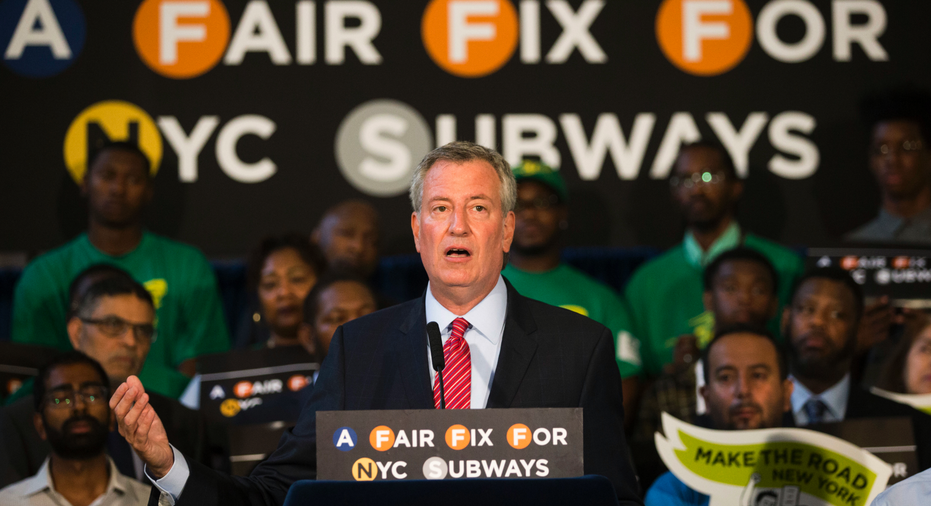NYC mayor promotes millionaires' tax to fix transit woes

NEW YORK – Mayor Bill de Blasio, flanked Monday by community activists, labor leaders and fellow Democratic politicians, officially rolled out a proposal for a millionaires' tax to help fix the subways and aid low-income commuters.
"People do not want to see this madness continue," de Blasio declared, citing people getting work reprimands, picking their kids up late and missing doctor appointments because of subway delays.
Henry Garrido, executive director of District Council 37, the municipal labor union, said that sometimes even the people tasked with fixing the subway can't get to work on time.
The number of subway delays has tripled in the past five years to 70,000 per month, and trains are overcrowded on some lines. About 5.7 million people take the subway on an average work day.
At the mayor's press conference, speakers stressed that the tax would affect only a handful of taxpayers — an estimated 30,000 to 35,000 — all of them in New York City. The tax, which would generate about $800 million annually, would increase the top income tax rate from about 3.9 percent to 4.4 percent for married couples who make more than $1 million and individuals making more than $500,000.
In turn, they said, the improvements would fuel the economy, benefiting rich and poor alike.
The proposal includes $250 million for half-priced Metrocards for 800,000 New Yorkers at or below the poverty level.
The tax, spearheaded in Albany by Democratic state Sen. Michael Gianaris of Queens and Assemblyman Daniel O'Donnell of Manhattan, must be approved by state lawmakers.
It faces significant challenges. Cuomo and the Republicans who control the state Senate have strongly resisted efforts to raise taxes on the wealthy in recent years. Assembly Speaker Carl Heastie, a Bronx Democrat, has repeatedly proposed higher taxes on millionaires to no avail.
The often frosty relationship between de Blasio and the Senate's Republican leaders won't help.
"I'm pleased Mayor de Blasio recognizes that additional funds contributed by the city would further that goal, but raising taxes is not the answer," said Senate leader John Flanagan, a Long Island Republican. Flanagan added that the city has a $4.2 billion surplus, "and therefore has the ability to do so with existing resources. Mayor de Blasio doesn't need to reach into the wallets of city residents to make that happen."
Gianaris said opponents "may posture in the beginning," he but predicted they'll come around.
O'Donnell agreed. "Public sentiment ... drives a lot of this. The public is paying attention to what the MTA is, who runs it ... and what they're doing with the money."
And the mayor's proposal doesn't address the need for emergency funding to fix the ailing system, transit officials and the governor said. Joseph Llota, chairman of the Metropolitan Transportation Authority, recently unveiled an emergency plan to stabilize the system at a cost of about $836 million. The governor offered to split the cost of the plan with the city, but the mayor refused to commit money to support it.



















